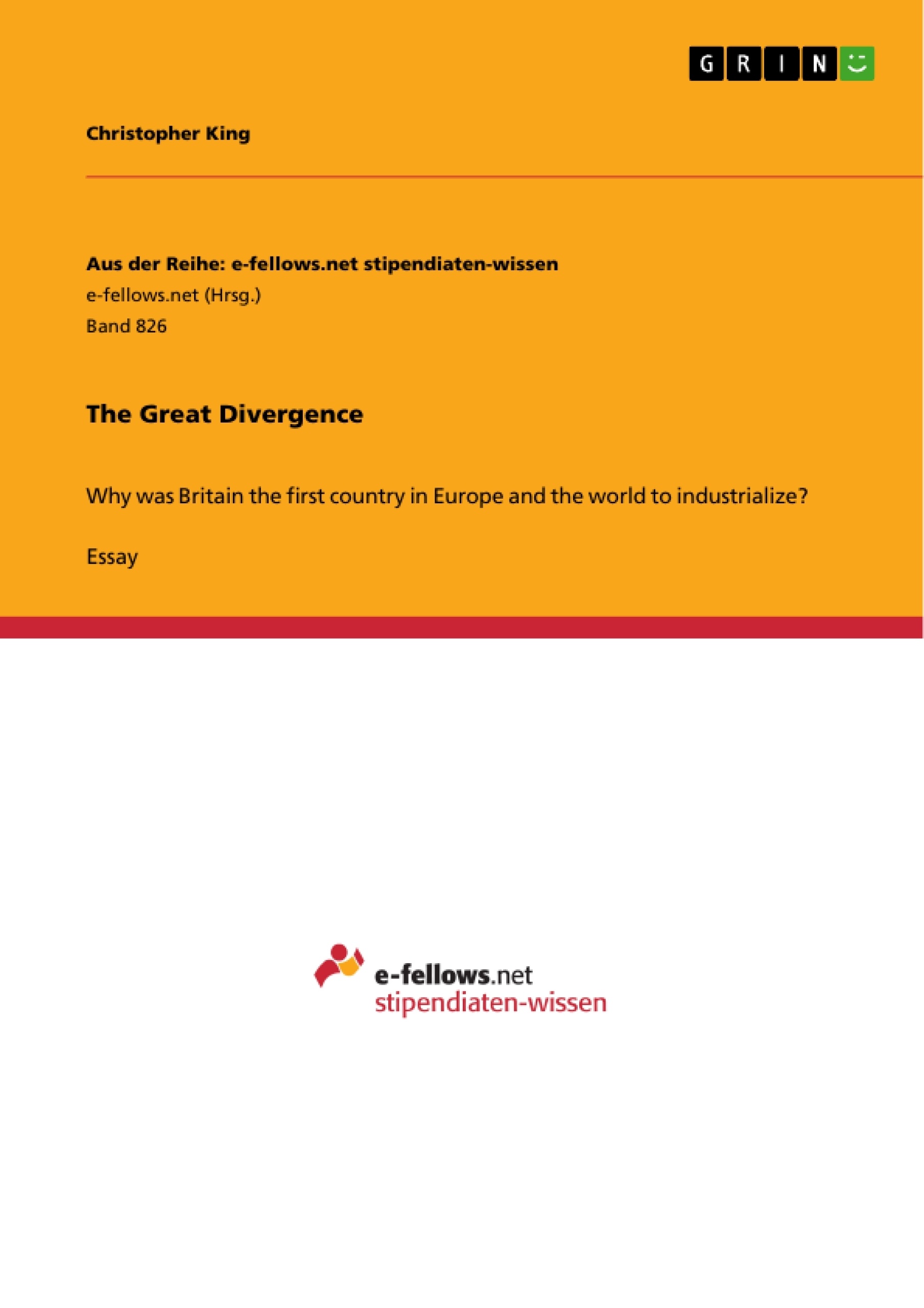“Great Divergence” is the term used to describe the economical asymmetry that happened between the West and other parts of the world. To explain the process of the Great Divergence, a two-step analysis is necessary: Why was Britain in the position to industrialize and why could the other parts of the world not follow the quest of Industrialization, which led ultimately to the Great Divergence? The Industrial Revolution in Britain and its diffusion to Western Europe was the single most important event for the Great Divergence to happen. Britain had unique geopolitical contingencies on its side and was able to pull of the Industrialization due to the functionality of its centralized state and its achieved dominance in international trade. Other parts of the world, namely India and China, did not industrialize because they lacked the incentives Britain had and, in addition to that, they were also held back by dynamics of colonialism or internal struggles.
The paper is structured in the following way: After a brief prologue and a look at a contested issue in the field (2.), the explanation will start out with processes and developments that were necessary in leading to the Industrial Revolution and Great Divergence (2.1). The next step is reserved for an in-depth analysis of the Industrial Revolution in Britain contrasted with a look at reasons for a lack of such an event in India and China (2.2). By looking at the diffusion of Industrialization in the West and factors that prevented any sort of that in the East (2.3), an understanding of the Great Divergence will be provided and ultimately finalized and comprehensively summarized in the conclusion (3.).
Inhaltsverzeichnis (Table of Contents)
- Introduction
- The Great Divergence
- The Lead-up to the Industrial Revolution
- Britain and the Industrial Revolution
- Diffusion of Industrialization in the West and Stagnation in the East
- Conclusion
Zielsetzung und Themenschwerpunkte (Objectives and Key Themes)
This paper aims to explain the "Great Divergence", which refers to the economic gap between the West and the rest of the world. It specifically investigates why Britain industrialized first, while other countries like India and China did not.
- The role of the Industrial Revolution in Britain and its impact on the Great Divergence
- Comparative analysis of the factors hindering industrialization in India and China
- The importance of geopolitical contingencies, including trade, colonialism, and state power
- The impact of the Commercial Revolution, mercantilism, and trade wars on the rise of Western Europe
- The influence of factors like wage levels, access to coal, and geographic advantages on industrialization
Zusammenfassung der Kapitel (Chapter Summaries)
The introductory chapter lays out the concept of the Great Divergence and explains the two-step approach taken to analyze its causes. It highlights the significance of Britain's Industrial Revolution and its diffusion to Western Europe, emphasizing the role of geopolitical factors.
The second chapter focuses on the historical context leading up to the Industrial Revolution. It examines the polycentric world before the Great Divergence, highlighting the importance of international trade, colonialism, and mercantilism. This chapter explores how Western Europe, particularly Britain, benefited from these developments while the East lagged behind.
The third chapter delves into the Industrial Revolution in Britain, contrasting it with the lack of such an event in India and China. The chapter explores the unique incentives and assets that enabled Britain's industrialization, including its high wage level, access to coal, and strategic geographic position. It also discusses the impact of Britain's focus on catching up with India in the cotton textile industry and the role of colonization in the New World.
Schlüsselwörter (Keywords)
The primary keywords and focus topics include: Great Divergence, Industrial Revolution, Britain, India, China, colonialism, mercantilism, trade, geopolitics, state power, wage levels, coal, technological change, and economic growth.
- Quote paper
- Christopher King (Author), 2013, The Great Divergence, Munich, GRIN Verlag, https://www.grin.com/document/262779




